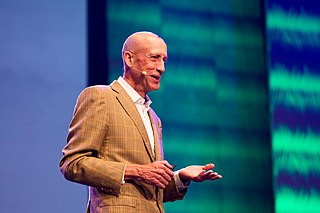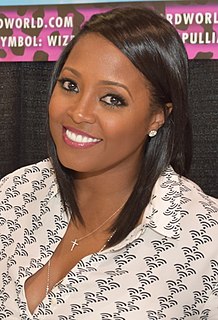A Quote by Kehinde Wiley
Branding says a lot about luxury and about exclusion and about the choices that manufacturers make, but I think that what society does with it after it's produced is something else. And the African-American community has always been expert at taking things and repurposing them toward their own ends.
Related Quotes
You know, when Trayvon Martin was first shot I said that this could have been my son. Another way of saying that is Trayvon Martin could have been me 35 years ago. And when you think about why, in the African American community at least, there's a lot of pain around what happened here, I think it's important to recognize that the African American community is looking at this issue through a set of experiences and a history that doesn't go away.
The best books, they don’t talk about things you never thought about before. They talk about things you’d always thought about, but you didn’t think anyone else had thought about. You read them, and suddenly you’re a little bit less alone in the world. You’re part of this cosmic community of people who’ve thought about this thing, whatever it happens to be.
Of course, you can never watch something like somebody else watches something like you, but nonetheless, you have to try. So I think on camera you learn a lot about how much the camera does for you, which is what is the great luxury of movie acting. Or acting whether it's TV or movies or whatever it is, that the camera's really such a gift because there's so much that it sees and does if you're willing to just be open and expose yourself and all of that. So you also learn what doesn't matter. And sometimes when you think about things, you think things matter that don't matter.
I'm always like that about everything. When I try to do something, I always think, "What is the best way to do this?" Instead of taking what everyone else says and how it has been forever, it's faster for me to try myself. Of course I listen to what everybody says, and at first I'll try what people say, but I always come back to trying it my way.
There are things that make me excited about what I'm doing: Trouble the Water [the 2008 documentary Glover executive produced] on New Orleans, or something like Soundtrack for a Revolution, about the power of the music of the civil rights movement [which he executive produced in 2009]. Or Bamako, about the African debt crisis, a platform to discuss the experience of people who actually live it. All of these are important ways we can use film as a forum inviting people into a dialogue.
Like anyone else in television, I like to explore my life experience. And I don't think African-American artists see doing shows or art about African-Americans as something 'less than.' I think maybe the industry sometimes does. We don't get as much attention, we don't get critical acclaim and so on.
It may seem to your conceited to suppose that you can do anything important toward improving the lot of mankind. But this is a fallacy. You must believe that you can help bring about a better world. A good society is produced only by good individuals, just as truly as a majority in a presidential election is produced by the votes of single electors. Everybody can do something toward creating in his own environment kindly feelings rather than anger, reasonableness rather than hysteria, happiness rather than misery.
That argument doesn’t make any sense to me. So we want to advance as a society and as a culture, but, say, if something happens to an African-American, we immediately come to his defense? Yet you want to talk about how far we’ve progressed as a society? Well, if we’ve progressed as a society, then you don’t jump to somebody’s defense just because they’re African-American. You sit and you listen to the facts just like you would in any other situation, right? So I won’t assert myself.
It does say something about a society when those who sue physicians and hospitals make as much or more money than those who heal disease. It says something about a society when it glorifies and rewards those who litigate while it demonizes and punishes those who produce the drugs and devices that keep it citizens alive and well.
I believe everything is autobiographical. If it's not strictly about you, it's your peers, your obsessions, things that make you angry, or things that you've been watching or obsessing about. Preoccupying you for reasons you don't necessarily know, but it's about you. It says a lot about you. It's like when someone tells you their dream and you sit there going, "Do you realize how much you're revealing about yourself right now?" It's kind of embarrassing.








































